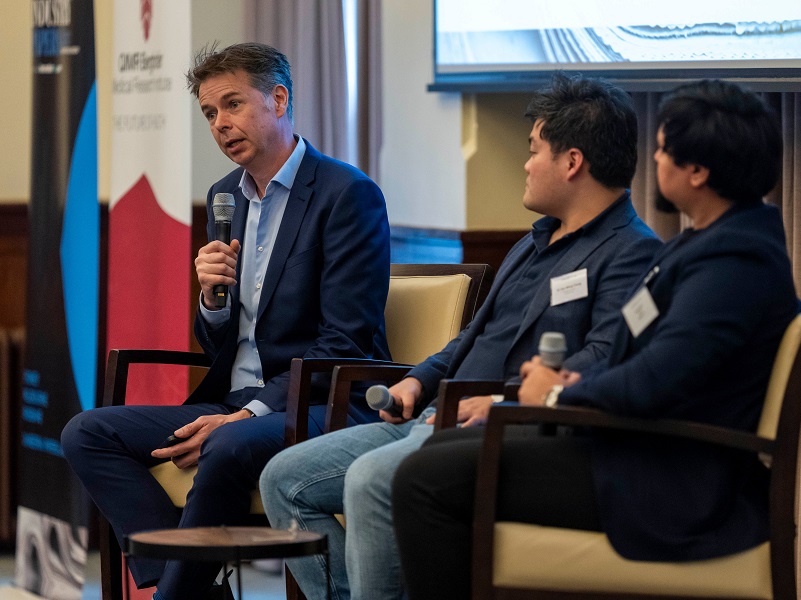With so little government investment into artificial intelligence research to unlock economic advantage, Australia has become an “AI cargo cult” waiting for ‘magical’ new products and services to be dropped from elsewhere, according to one of the country’s top AI academics.
That’s the view of Anton van den Hengel, who believes the opportunity is there for the taking, given that Australia already enviable AI capability, a world-class education system and immense wealth from abundant natural resources.
And as the director of the Australian Institute for Machine Learning’s Centre for Augmented Reasoning and a former director of machine learning at technology giant Amazon, it’s an insight that carries weight.

At the launch of InnovationAus.com Industry Papers last week, Professor van den Hengel said Australia’s AI opportunity is immense and that not getting behind the “technology of our time” will only further weaken productivity and GDP.
In this year’s Budget, the federal government set aside no new funding for AI research and development despite other countries like Canada, South Korea and Singapore channeling huge sums of money towards the technology.
The Albanese government has instead focused much of its efforts to date on regulating the use of the technology, and earlier this month proposed EU-style mandatory guardrails and a new voluntary safety standard.
But Professor van den Hengel believes the federal government should expend less energy on regulating AI that is not developed or hosted here, and do more to boost Australia AI capability, which is already the envy of countries like Israel.
“We are an AI cargo cult. We’re out standing on the beach hoping that the AI that we would like turns up of someone else’s doing,” he told the audience at Old Parliament House last Wednesday.
“We’ve got guardrails, we’ve got all sorts of policies. We’ve cornered the market in the fear of AI. But all of those actions, all of those guardrails, all of that fear is entirely irrelevant because AI is not developed here.”
“The only way that you participate in the modern economy is by fighting back. We have to deploy our technology overseas to capture that economic advantage. It’s the only way forward.”
Professor van den Hengel said AI and large language models (LLMs) – like electricity before it – would increasingly become indispensable to the modern economy, underpinning every application developed “from now on”.
“[LLMs are] core infrastructure to the modern economy. If you don’t have one, then you’re building on other peoples’ infrastructure. It’s like trying to build a business here using electricity shipped from the United States.
“It’s not optional. The question isn’t whether we’re going to do it, it’s only when we’re going to do it. And the sooner we do it, the less lead time we give absolutely everyone else.”
For now, he said, the debate in Australia has been captured by whether we can compete with or outcompete companies like Microsoft, which has invested billions into ChatGPT maker OpenAI over the last five years.
“It’s ridiculous. We don’t need to outcompete Microsoft.The electricity system that we’ve got was invented partly in America and partly in Germany. We didn’t decide not to put in an electricity system because we couldn’t outcompete America on electricity.”
Professor van den Hengel and the 13 other leading AI experts that make up the Kingston AI Group have been calling on the federal government since at least May 2023 to provide $1 billion for AI research and development.
Around half the funding would be used to build core skills, including at universities, TAFE and schools, with the remaining $500 million for innovation – the “antithesis” of the National Reconstruction Fund and Future Made in Australia.
In comparison, countries like Israel are “right at the other end of the spectrum”, funding “first time founders [with] wacky ideas” that build capacity so that “commercial money can invest where it should”.
“For a billion dollars, we really can see the outcome we want to achieve,” he told a panel after his keynote, adding that this wouldn’t just pay for the outcome but build a system that “would generate the outcome for generations to come”.
Industry minister Ed Husic earlier this month defended the government’s track record, arguing that the existing $1 billion in funding available to enabling capabilities through the National Reconstruction Fund is adequate.
InnovationAus.com would like to The Industry Papers’ sponsors Geoscape Australia, The University of Sydney Faculty of Science, the Semiconductor Sector Service Bureau (S3B), AirTrunk, InnoFocus, ANDHealth, QIMR Berghofer, Advance Queensland and the Queensland Government.
You can purchase a copy of the papers here.
Do you know more? Contact James Riley via Email.

